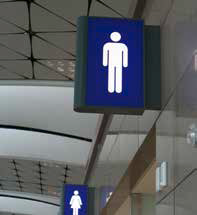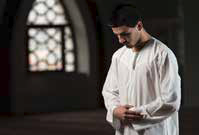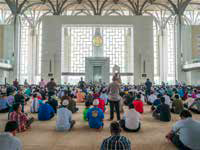


Dthikr of entering and leaving the bathroom.
Dthikr of entering the bathroom:
One who enters the bathroom should say the Dthikr that is narrated in the following Hadeeth reported in Saheeh Al-Bukhāriy and Saheeh Muslim:
Anass (ABPWH) said, “Whenever the Prophet (PBUH) entered the bathroom he would say, ‘O Allāh, I seek refuge with you from Khubuth/Khubth and Khabā’ith.’.” (Al-Bukhāriy no. 6322, Muslim no. 375)
Khubuth in Arabic (pronounced with letter u after the letter b) means male devils, and in this case Khabā’ith would mean female devils.
On the other hand, Khubth in Arabic (pronounced without letter u after the letter b) means evil, and in the this case Khabā’ith would mean evil-doers. This meaning according to the latter spelling is more general and is the most narrated by the scholars.
Dthikr of leaving the bathroom:
‘Ā’ishah, may Allāh be pleased with her, mentioned that when the Prophet (PBUH) used to step out of the bathroom, he would say, “Ghufrānak” (i.e. I ask Your forgiveness, O Allāh). (Ahmad 6/155 no. 25220, Abū Dāwood no. 30, and At-Tirmidthiy no. 7)

Preparing one’s will.
Preparing the will is an act of Sunnah during health and illness. The Prophet (PBUH) says: “It is the duty of a Muslim who has something which is to be given as a bequest, not to let two nights pass without having his will written down with him.” (Al-Bukhāriy no. 2783, Muslim no. 1626)
By “two nights” the Prophet (PBUH) means to symbolize for a short period of time, not specifically two nights. This has been stressed on because no one knows exactly when they will die.
As for the rights of Allāh Almighty regarding Zakat, Hajj, or any sort of Kaffārah (i.e. expiation), in addition to people’s rights regarding debts, they are obligatory and not just Sunnah, so one must write them down in his will, especially if no one knows about them, and there is a rule in Principles of Fiqh that states, “Whatever thing an obligation cannot be accomplished without, is an obligation.”

Kindness and leniency in buying and selling.
This is proven by the following Hadeeth:

Praying two Rak‘ahs after performing ablution.
This is from the daily Sunan that have great virtue and entail great reward. Abu Hurayrah (ABPWH) reported that the Prophet (PBUH) once said to Bilāl at the time of Fajr prayer, “Bilāl, tell me about the act you have done that you deem would be the most rewarding for you with Allāh, for I heard the sound of your footsteps in front of me in Paradise.”
Bilāl (ABPWH) replied, “I have not done a deed that I deem would be the most rewarding for me with Allāh, except that I have never performed ablution during any hour of night or day unless I offered prayer with that purification as much as Allāh has written for me to pray.” (Al-Bukhāriy no. 1149, Muslim no. 2458)

Waiting for prayer.
Waiting for prayer is a Sunnah that has a great virtue and entails great reward.
Abu Hurayrah (PBUH) said that the Prophet (PBUH) said, “One is considered in prayer as long as he is waiting for prayer, and nothing but the prayer is preventing him from going to his family.” (Al-Bukhāriy no. 659, Muslim no. 649)
Thus, Muslims are rewarded for waiting for prayer exactly as they are rewarded for the prayer itself.
Abu Hurayrah (ABPWH) said that the Prophet (PBUH) said: “The angels pray for every one of you as long as he remains in the place in which he prayed and does not break his Wudū’ (ablution). The angles say, ‘O Allāh, forgive him. O Allāh, have mercy to him.’.” (Al-Bukhāriy no. 659, Mulsim no. 649)
In another narration by Imām Muslim it says, “… as long as he neither hurts anybody nor invalidates his ablution.” (Muslim no. 649)
Thus, this reward is conditional, and the condition is to avoid doing any harm to others and to avoid invalidating Wudū’.

Siwāk (Tooth-stick).
Siwāk is from the Sunan that may be done at anytime. The Prophet (PBUH) persistently urged us to use it. Anass (ABPWH) narrated that the Prophet (PBUH) said: “I have indeed urged you regarding Siwāk.” (Al-Bukhāriy no. 888)
‘Ā’ishah, may Allāh be pleased with her, narrated that the Prophet (PBUH) said: “Siwāk cleanses the mouth and pleases the Lord.” (Ahmad no. 7 and An-Nasā’iy no. 5)
Using Siwāk is most recommended in certain situations such as upon night prayer, upon Wudū’, before every prayer, and on entering one’s home, and Allāh knows best.

Renewal of Wudū’ for every prayer.
It is Sunnah to renew Wudū’ for every prayer. If a Muslim has made Wudū’ for Maghrib prayer and is still maintaining his state if Wudū’ when ‘Ishā’ time comes in, it is Sunnah to perform Wudū’ again at ‘Ishā’ time.
This is proven by the following Hadeeth:
Al-Bukhāriy reported, “The Prophet (PBUH) used to make Wudū’ for every prayer.” (Al-Bukhāriy no. 214)
It is also Sunnah for a Muslim to maintain his state of Wudū’ during the day. Thawbān (PBUH) said that the Prophet (PBUH) said, “No one maintains his state of Wudū’ except a believer.” (Ahmad no. 22434, Ibn Mājah no. 277, and Ad-Dārimiy no. 655)



